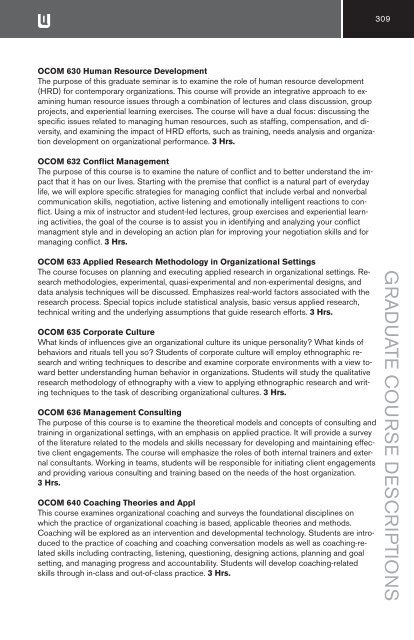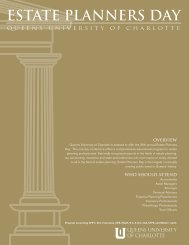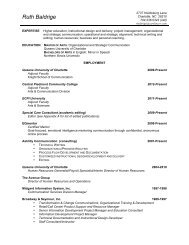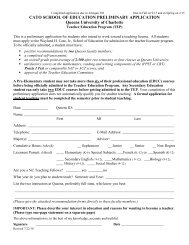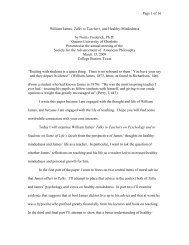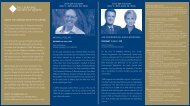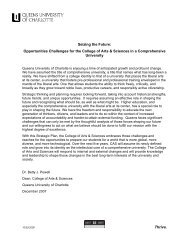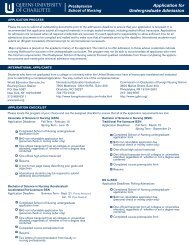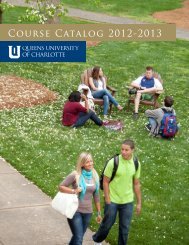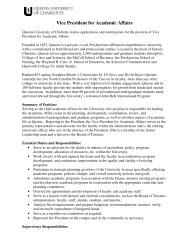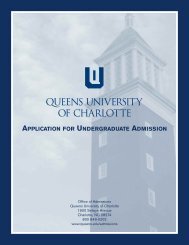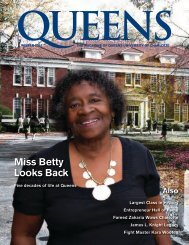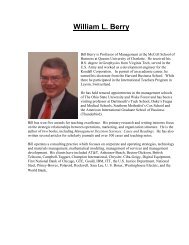2008-2009 Academic Catalog - Queens University of Charlotte
2008-2009 Academic Catalog - Queens University of Charlotte
2008-2009 Academic Catalog - Queens University of Charlotte
You also want an ePaper? Increase the reach of your titles
YUMPU automatically turns print PDFs into web optimized ePapers that Google loves.
309<br />
OCOM 630 Human Resource Development<br />
The purpose <strong>of</strong> this graduate seminar is to examine the role <strong>of</strong> human resource development<br />
(HRD) for contemporary organizations. This course will provide an integrative approach to examining<br />
human resource issues through a combination <strong>of</strong> lectures and class discussion, group<br />
projects, and experiential learning exercises. The course will have a dual focus: discussing the<br />
specific issues related to managing human resources, such as staffing, compensation, and diversity,<br />
and examining the impact <strong>of</strong> HRD efforts, such as training, needs analysis and organization<br />
development on organizational performance. 3 Hrs.<br />
OCOM 632 Conflict Management<br />
The purpose <strong>of</strong> this course is to examine the nature <strong>of</strong> conflict and to better understand the impact<br />
that it has on our lives. Starting with the premise that conflict is a natural part <strong>of</strong> everyday<br />
life, we will explore specific strategies for managing conflict that include verbal and nonverbal<br />
communication skills, negotiation, active listening and emotionally intelligent reactions to conflict.<br />
Using a mix <strong>of</strong> instructor and student-led lectures, group exercises and experiential learning<br />
activities, the goal <strong>of</strong> the course is to assist you in identifying and analyzing your conflict<br />
managment style and in developing an action plan for improving your negotiation skills and for<br />
managing conflict. 3 Hrs.<br />
OCOM 633 Applied Research Methodology in Organizational Settings<br />
The course focuses on planning and executing applied research in organizational settings. Research<br />
methodologies, experimental, quasi-experimental and non-experimental designs, and<br />
data analysis techniques will be discussed. Emphasizes real-world factors associated with the<br />
research process. Special topics include statistical analysis, basic versus applied research,<br />
technical writing and the underlying assumptions that guide research efforts. 3 Hrs.<br />
OCOM 635 Corporate Culture<br />
What kinds <strong>of</strong> influences give an organizational culture its unique personality? What kinds <strong>of</strong><br />
behaviors and rituals tell you so? Students <strong>of</strong> corporate culture will employ ethnographic research<br />
and writing techniques to describe and examine corporate environments with a view toward<br />
better understanding human behavior in organizations. Students will study the qualitative<br />
research methodology <strong>of</strong> ethnography with a view to applying ethnographic research and writing<br />
techniques to the task <strong>of</strong> describing organizational cultures. 3 Hrs.<br />
OCOM 636 Management Consulting<br />
The purpose <strong>of</strong> this course is to examine the theoretical models and concepts <strong>of</strong> consulting and<br />
training in organizational settings, with an emphasis on applied practice. It will provide a survey<br />
<strong>of</strong> the literature related to the models and skills necessary for developing and maintaining effective<br />
client engagements. The course will emphasize the roles <strong>of</strong> both internal trainers and external<br />
consultants. Working in teams, students will be responsible for initiating client engagements<br />
and providing various consulting and training based on the needs <strong>of</strong> the host organization.<br />
3 Hrs.<br />
OCOM 640 Coaching Theories and Appl<br />
This course examines organizational coaching and surveys the foundational disciplines on<br />
which the practice <strong>of</strong> organizational coaching is based, applicable theories and methods.<br />
Coaching will be explored as an intervention and developmental technology. Students are introduced<br />
to the practice <strong>of</strong> coaching and coaching conversation models as well as coaching-related<br />
skills including contracting, listening, questioning, designing actions, planning and goal<br />
setting, and managing progress and accountability. Students will develop coaching-related<br />
skills through in-class and out-<strong>of</strong>-class practice. 3 Hrs.<br />
GRADUATE COURSE DESCRIPTIONS


